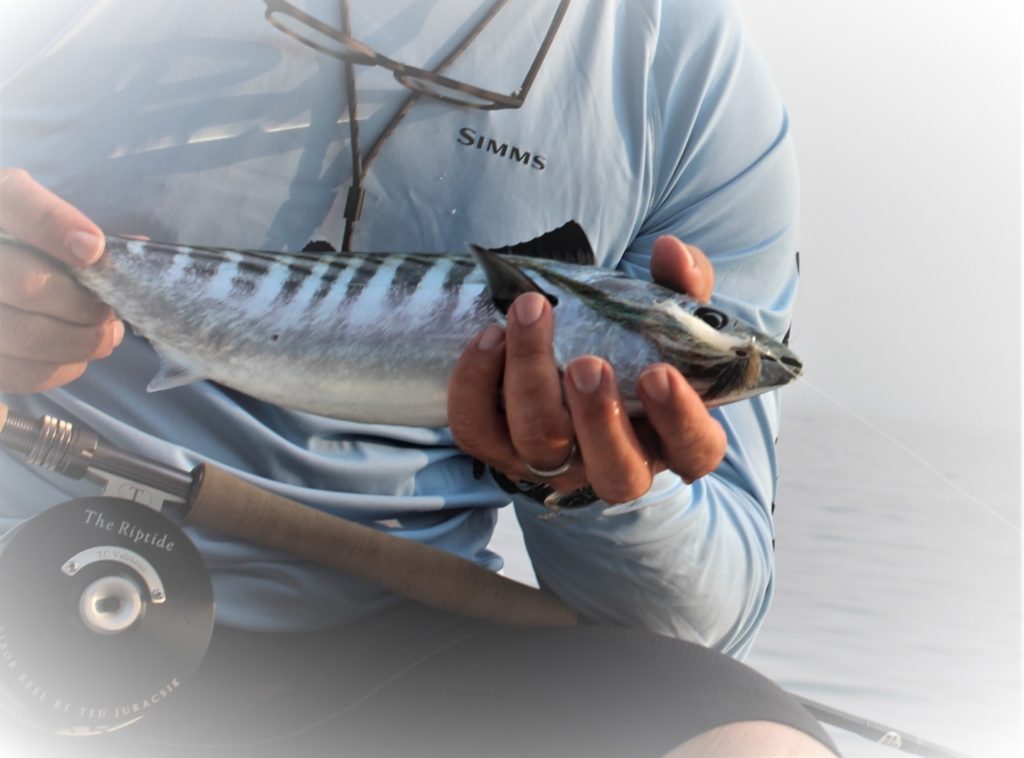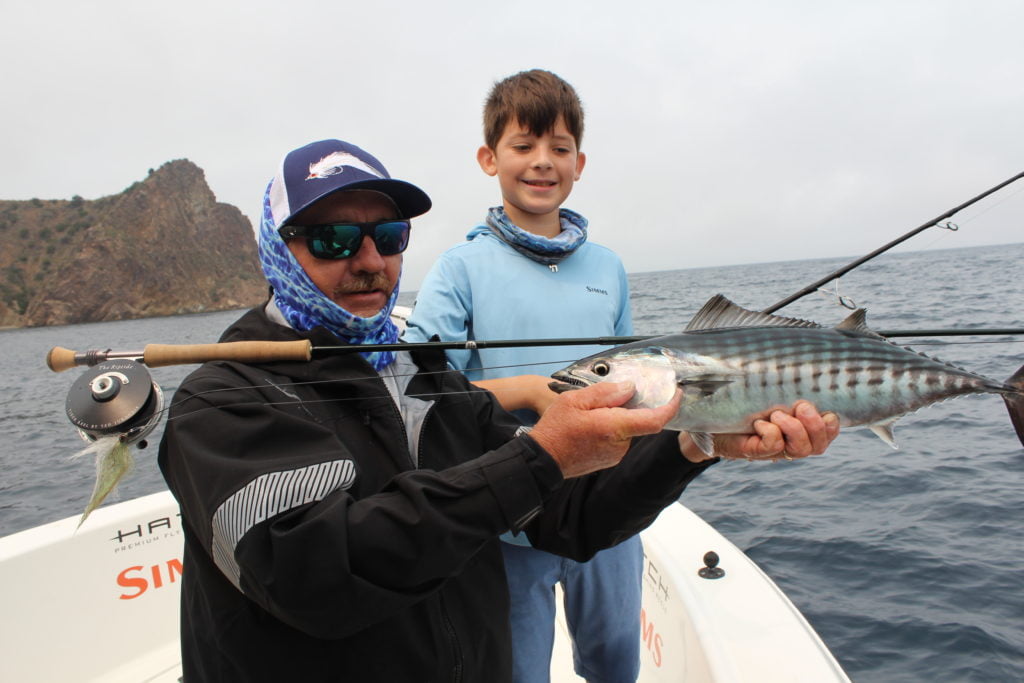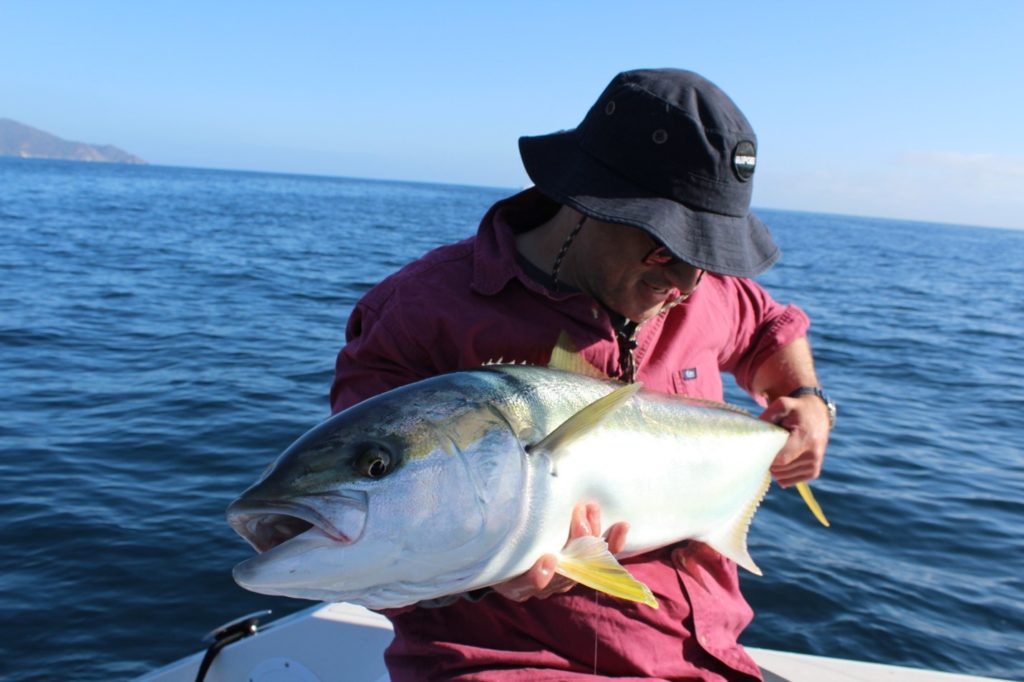By TC Valentine

Vaughn’s Salon- Catalina Island, 8:03 AM PST. In only 80 feet of marine blue water clear enough to see rock formations, yellow kelp forest and aqua green shadows lurking- the Hummingbird fish finder shows big red marks. “Yellowtail under the boat.” Growing up in southern California is wonderful but the eastern sierra mountains are 6 hours away. Trout fishing remains my passion, but the big blue Pacific Ocean is out my front door. With a little more opportunity to fish in the ocean, we have made the switch. Now, we fish trout and salt.
Santa Catalina sits about 26 miles off the California coast with 2,500-foot trenches and deep upwellings with nutrient rich water. It is the ideal habitat for pelagic fish. There is resident yellowtail with water temperature around 66-68 degrees. When the El Nino current pushes (water temp goes up to 74 degrees) up from Mexico, migrator pelagic tuna, dorado and yellowtail can come to the island. The Chicago Cubs once did their training camp at the famous Wrigley field in Avalon. The weather is usually temperate, and the ocean is an aqua blue, I call it Catalina blue. To fish these waters is unpredictable and big fish lurk. They are always around. It is a big draw for an emerging sport, California saltwater fly fishing.
Capitan Vaughn Podmore runs daily trips to this island and sometimes another 14 miles to San Clemente. He rarely uses more than one fly, but the green sardine is first choice. My son Miles joined us on this trip and it was his first-time fly fishing on the ocean. To see him so excited to catch these fish made my heart sing. It is at this moment when you realize what this sport can do. It is about the experience, connecting to the rawness of undeveloped land that is still roughed and the fishing is still amazing. He truly found his manhood fishing with dad. We did it with some of the best equipment, the best fishing guides and the sharpest sardine fly patterns. It helps to have a guide like Vaughn too. He is consistently teaching, encouraging and tells a few good jokes. Several I cannot mention, but they are funny to the bone.

The fish are smart. Flies must move the right way, show the right colors and move fast. Jigging patterns catch calico. Yellowtail, bonito and barracuda need to chase fleeing sardines. In order to do this, you got to throw long and hard with fast pulls. There is no other way about it. Many fly fishers do not catch fish on the island because of their approach, fly selection and lack of local knowledge. Yet, we had a great guide and he put us on the fish. Big yellowtail doesn’t eat flies much, but when they do, you’ll catch the fish of a lifetime. Bonito and barracuda hold Ph.D.’s in fly selection. We brought the secret weapon, Winston’s Alpha +, 10 weight which can throw 450 grain sinking lines, 90 feet. Fishing for these pelagic fish requires long-deep throws and fast retrievals to mimic fleeing sardines.
The reason we got bit so much was because of the ability to cast far from the boat, sink the line and strip fast. Rod selection for this application was an important reason why young Miles was able to experience something very few do. He caught 20 bonito on the fly. Granted, I cast but he stripped and landed those fish. I felt that experience embedded a magical pixie dust in his soul. It is the same one my grandfather left in me. Generational, legacy experiences with a heritage brand of fly rods. I call it good company. If you go to the island, 10 weights are a minimum requirement, 01-0/4 bait fish (I like the EP peanut butter sardine patterns) and 450 grain sinking lines work best. You need to take long shots and fast stripping pulls and you might catch a fish of a lifetime.

Equipment matters. Performance matters. R.L. Winston rods fish better. The new Alpha + 10 weight holds the powerful butt section and a supple, smooth progressive tip which allows 0/4 EP Peanut Butter sardine (and a few secret) patterns to reach 90 feet from the boat. With fast sinking lines and rapid stripping, aggressive pelagic yellowtail, bonito and barracuda can check into Vaughn’s salon, but rarely make it out. Big yellowtail amberjack will take long pulls into kelp forest and rocks. A rod that can handle these obstacles as well as allow anglers 70-100 casts per day should be given an award. This is a life-time achievement award yellowtail amberjack. When this fish was released, it touched the hand of God. It was breathtaking, completely peaceful and an experience I will never forget. It is our legacy fish.

TC Valentine is a Winston enthusiast living in Southern California and enjoys trout fishing in the Eastern Sierras or in the blue waters of the Pacific with his eleven year old son, Miles.


